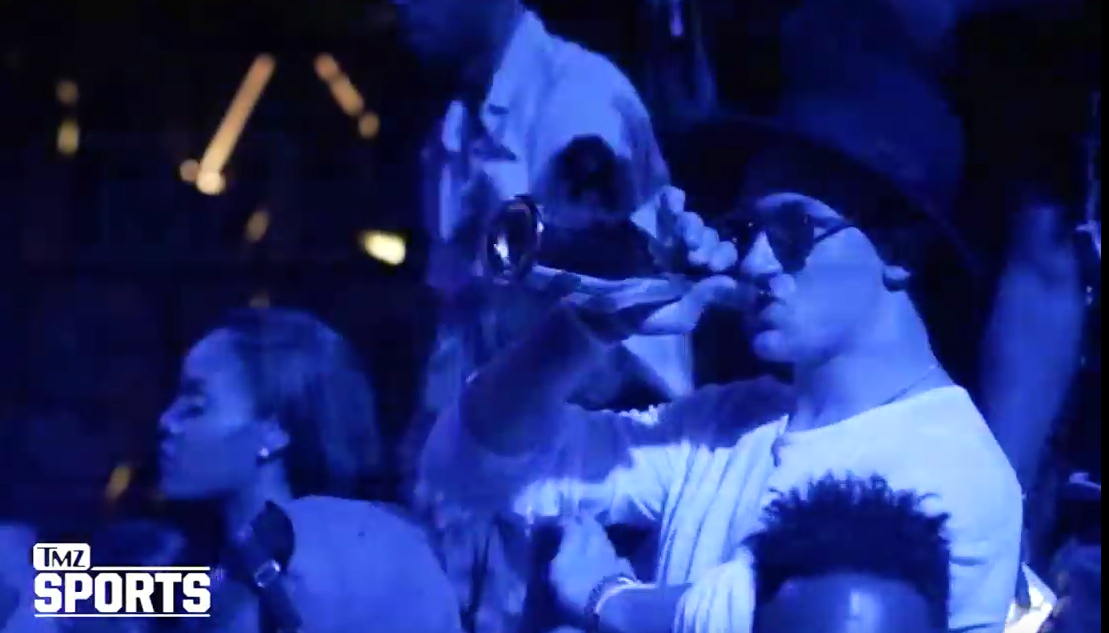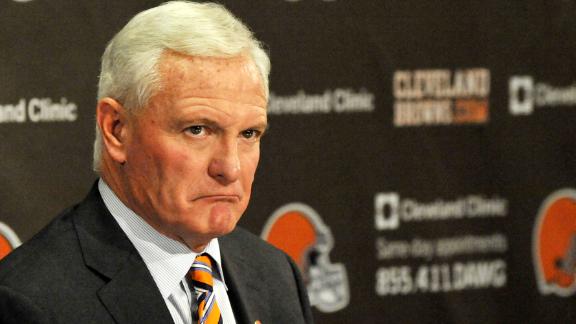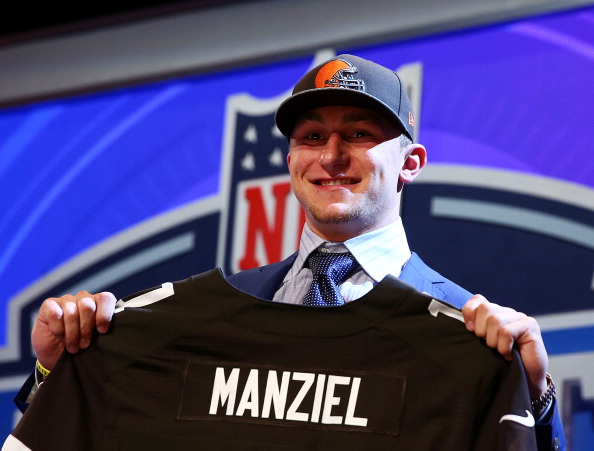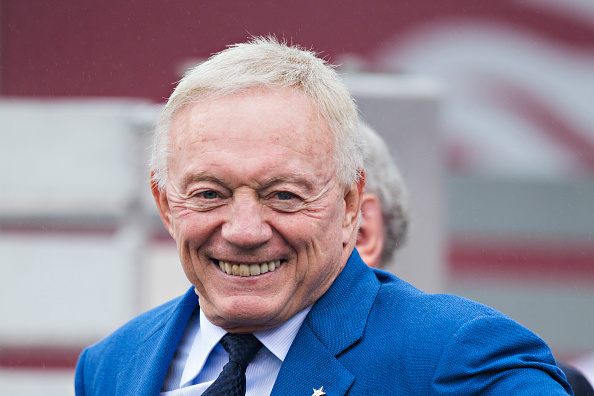You’ve seen it. We’ve all seen it.
The fantastic crash on the side of the road. Not the run-of-the-mill two-car fender bender, but the one where the hood is up and the entire engine is engulfed in flames. Not the simple flat tire being fixed on the freeway, but that time when a wheel suddenly decided to fly off at 70 miles per hour and shoot up in the air 50 feet, almost landing on another car before shredding into pieces.
There are more than 25,000 car accidents every day in the United States, so it’s impossible to remember every one you’ve ever seen. But those absolutely fantastic crashes are the ones we remember for the rest of our lives; the ones we use as allegories when we’re writing stories about football players.
Yes, this is about Johnny Manziel—the latest absolutely fantastic crash in the NFL.
“He still has potential and I don’t think it’s a sad ending. I don’t think it’s an ending for him. He’s what, 23 years old? If he gets the help that he needs and he does the training that he’s supposed to do, and does all of the things that we always talked about when I talk to him, then I believe he can be a starting quarterback in the National Football League. If he doesn’t, I don’t know what can happen.”
That quote, via Mary Kay Cabot of Cleveland.com, is from Manziel’s soon-to-be former teammate Donte Whitner, speaking at the Cleveland Auto Show on Monday night. Whitner was asked about Manziel after the latest report (and TMZ video) surfaced of him out partying and drinking in multiple clubs in Miami; the same day his domestic violence case was handed over to a grand jury in Texas.
“I saw him in the club again, drinking out of the bottle with the hat and glasses on,” Whitner said. “It was like, there was really a lot of empathy there because if you get everything that you care about and worked so hard for all of your life stripped away from you, all the allegations that’s going on, there’s no way that you can be out partying and doing whatever, so there might be a serious problem there.”
There’s the aftermath to any crash. An engine block on fire may look spectacular to the passersby, but for those in the car, it’s scary as hell. After the fire eventually subsides comes the collateral damage—getting home, replacing the belongings inside, buying a new car, heck, even getting a ride to work because your insurance won’t cover a rental — which puts a strain on everyone involved.
Manziel’s teammates can see the collateral damage. Shoot, they’re part of it. The decision to draft him may have set the franchise back five or ten years, and that’s a conservative estimate. Coaches and executives were all fired, seasons were lost, player’s prime years have been wasted because someone in the organization—from owner Jimmy Haslam on down—thought Manziel was the answer.
Not only was taking Manziel in the first round a mistake for Cleveland—worsened somewhat by the early-career success of Teddy Bridgewater and Derek Carr, who were taking shortly after Manziel—but now the franchise has to use another first round pick, per reports, on a quarterback this season, or roll the dice and use the second overall pick on another position of need before overpaying for a free agent in an insanely slim market or hoping one of the quarterbacks they like in the NFL Draft slides into the second round.
Long after Manziel’s burned-out frame is hauled away in Cleveland, debris will still be littering the streets, the remnants of the crash causing delays as far as the eye can see. Cleveland’s logo may as well become a row of orange cones.
Sorry, this lane closed.
There hasn’t been an NFL crash this fantastic in years. We have a tendency to make everything into a circus, yes, but most people would probably be happy at this point to ignore Manziel altogether. It’s Johnny Football—he’s probably going to need a new nickname in a few weeks—who keeps making us pay attention. He’s the tire fire that will never go out, no matter how hard they try. And people are trying. Hell, even Whitner still thinks Manziel is capable of getting his life back together to be a starting quarterback in the NFL. Even Whitner still wants to help put out the fire.
“There’s not too many people that can reach him or talk to him and there’s some people that can so hopefully we can do that,” he said. “I actually realized that he’s in Miami a lot and that’s where I train and it wouldn’t be a bad thing to get together and train and talk and hang out and just really see.”
To be fair, this is about more than Manziel. This is about our collective fascination with the recurrence of crashes this fantastic almost as much as those, themselves, who are involved in the crash. We are obsessed with the destruction of it all, and the rubbernecking delays for Manziel’s crash are as long and as jammed as any in recent memory.
Manziel’s crash is so spectacular it’s worth all the traffic it creates.
Let’s be sure, though, to remember that Manziel isn’t the only one. He’s not even the only one in Cleveland. Whitner, himself, had to answer questions about another teammate with a propensity to crash, as Josh Gordon has been out of football for a year, trying to come back to the game after being suspended as part of the league’s substance abuse policy. Gordon has submitted an appeal for reinstatement and will find out his fate later in March, and Whitner thinks Gordon has learned from his past crashes and can get his act together. Why? Because he has to. It’s human nature to find the best in people you know, just like it’s human nature to be mesmerized by celebrities you don’t know—especially rich and famous athletes—burn it all away when they aren’t able to juggle work with life.
http://gty.im/460464144
Some people are troubled and struggle with addiction and dependence. Some are just young, rich and dumb. Whether Manziel and Gordon are the former, the latter or a combination of both really doesn’t matter. The crash is the same, the collateral damage just as severe and the traffic they create, just as dense. The only difference is if we look on with a sense of genuine concern or schadenfreude.
Either way, we cannot stop looking. And that’s exactly what the NFL wants.
No, the National Football League is not running a babysitting service, but if there has ever in the history of the league been a player screaming and crying for help, its Manziel. His agent quit. His own father said if he doesn’t get his act straight he’ll be dead within the year. He’s a week away from getting cut from the only team stupid enough to draft him and the only other team stupid enough to be rumored to want him no longer has any interest because the flames of his most recent crash—a domestic violence incident, in today’s NFL?!?!—are even too hot for Jerry Jones. Besides, Jerry has his own accident to clean up with Greg Hardy this off-season.
The NFL is lined with failures on the field; players we all thought would be good but couldn’t hack it in the pros. Yet the ones who fail off the field—especially the ones who have the talent and squander it—are as important to the league as its stars.
Manziel is as important to the NFL as Tom Brady or Peyton Manning or Russell Wilson or any other quarterback we talk about constantly. Because we talk about them constantly. If Manziel were a mediocre quarterback who is fast but undersized and led Cleveland to eight wins, who cares? Honestly, who really even cares?
Everybody seems to care about this version of Manziel. Everybody wants stop and stare at the crash. Whether the NFL uses his demise as a cautionary tale or a marketing tool may depend on your level of cynicism. And how close to the crash you’re willing to get.










